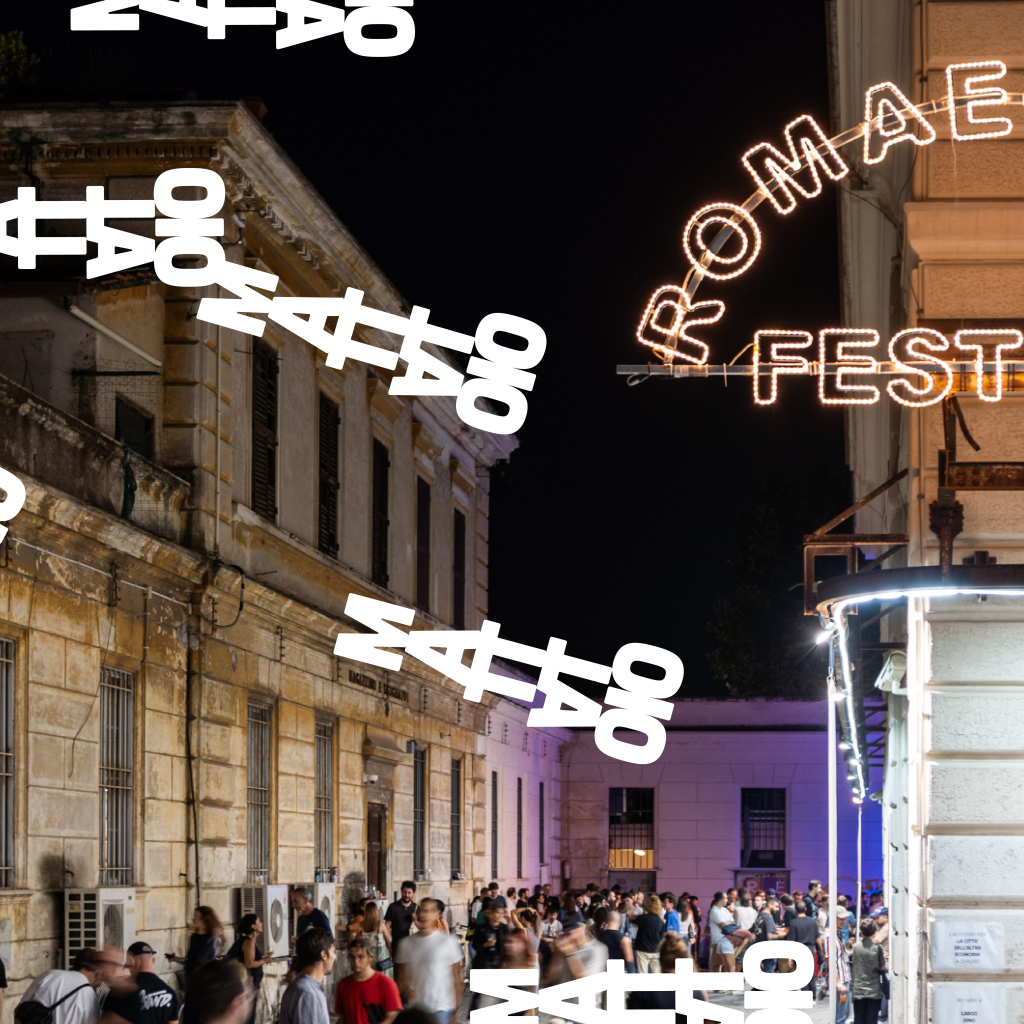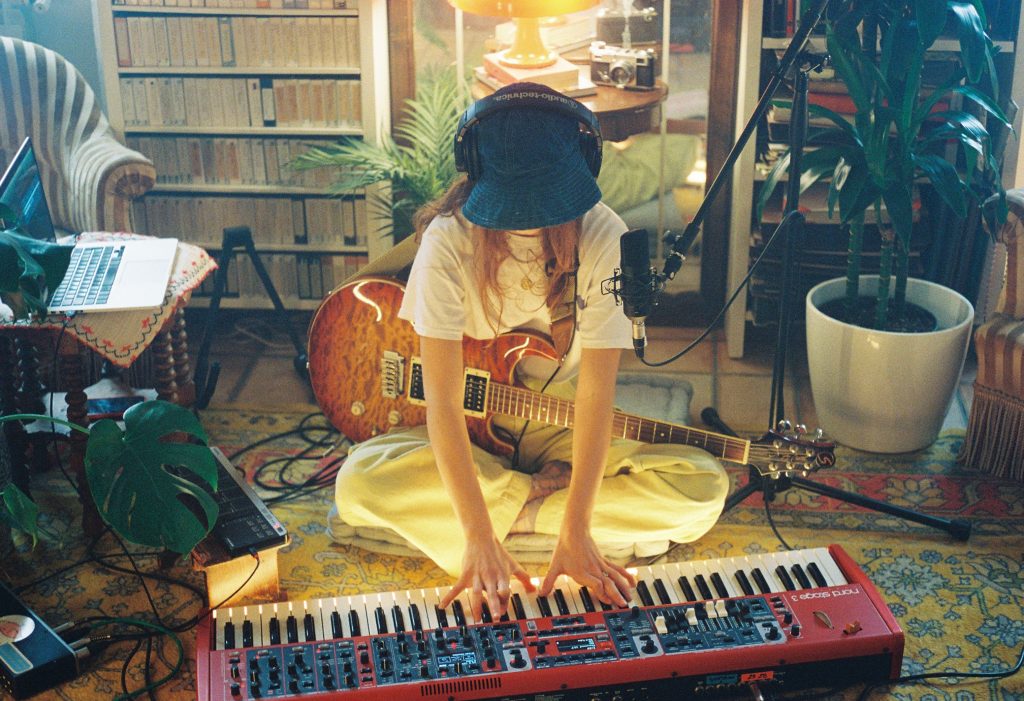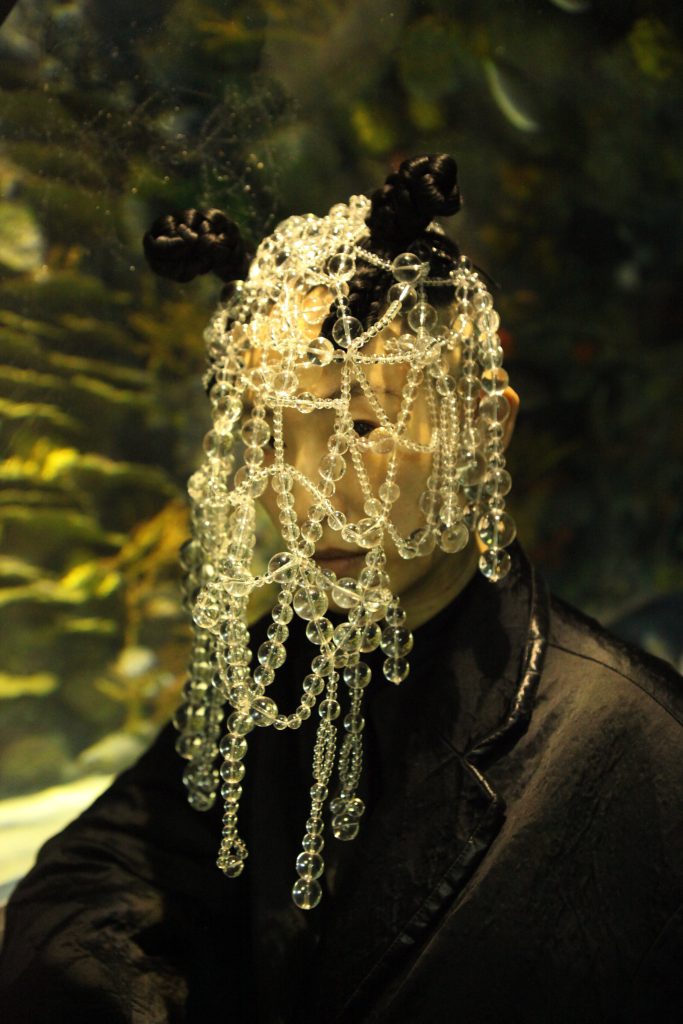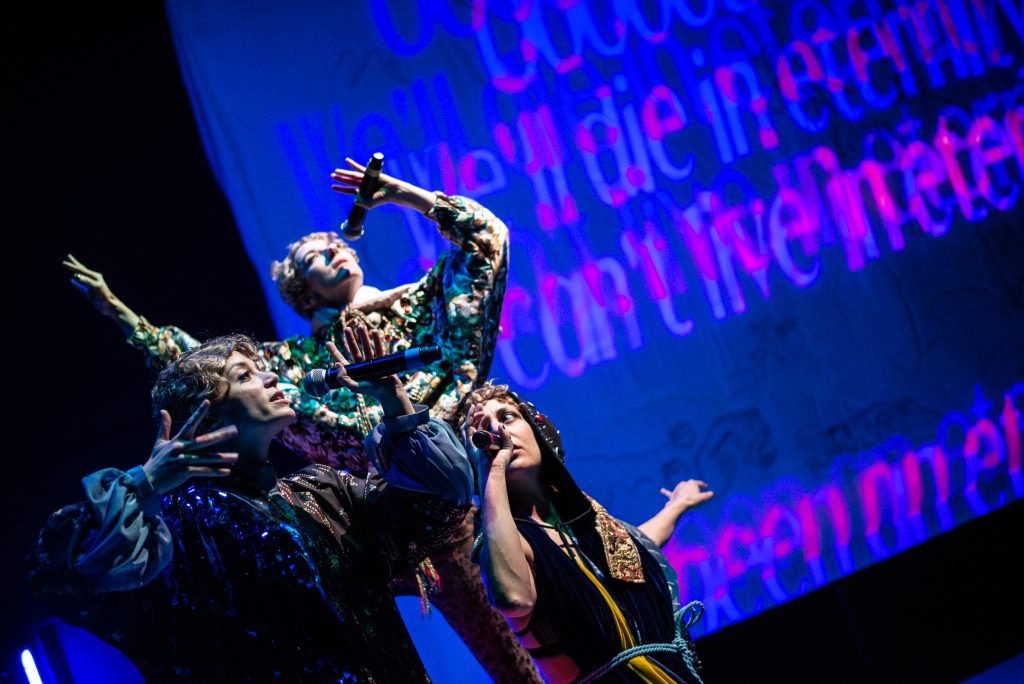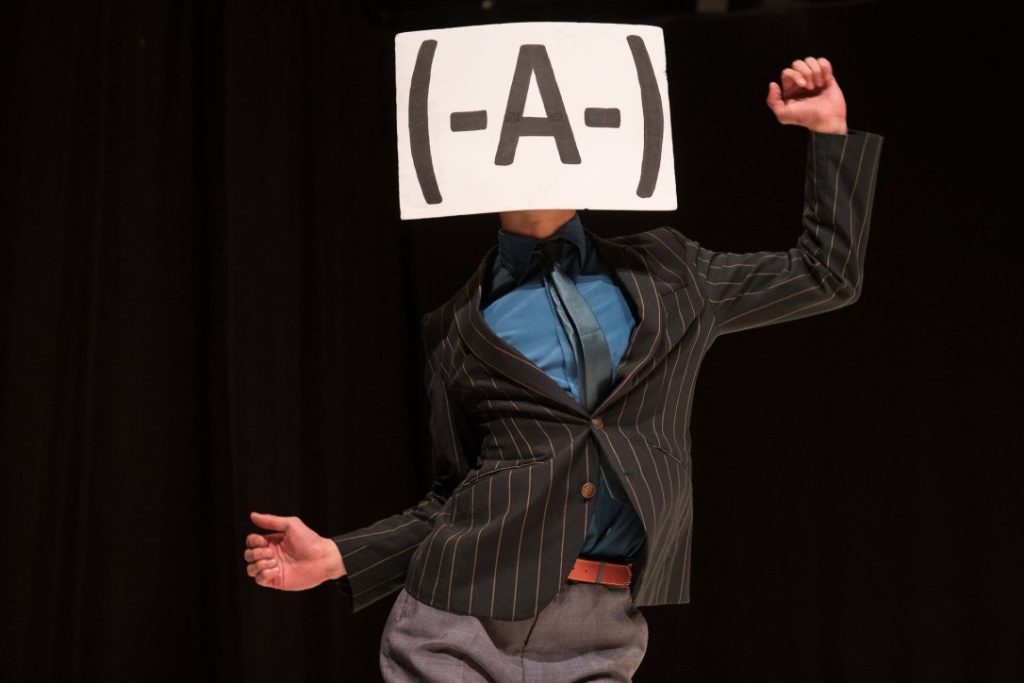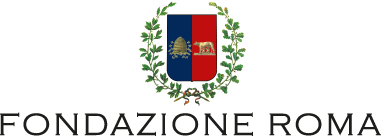For english version scroll down
Download programma ITA / Download program ENG
Info & Box office /┬Ā06.45553050
Anche quest’anno il Mattatoio torna ad essere il cuore pulsante della creativit├Ā emergente del Romaeuropa Festival! La Pelanda del Mattatoio, grazie alla collaborazione con Azienda Speciale Palaexpo, sar├Ā, anche quest’anno, l’hub delle attivit├Ā del Romaeuropa Festival 2024, nonch├® lo spazio dedicato al sostegno della creativit├Ā emergente. Qui il festival ospita la sua proposta pi├╣ innovativa e le sezioni che attraversano il suo intero programma.
Tanti i temi, che nei due mesi di programmazione attraverseranno le sale teatrali del Mattatoio coniugando realt├Ā e finzione, linguaggi e discipline come accade gi├Ā il 21 e il 22 settembre con il focus dedicato alla compagnia BERLIN con la quale Romaeuropa avvia le sua attivit├Ā al Mattatoio.┬ĀAttualmente alla guida di NTGent dopo Milo Rau, il gruppo fiammingo guidato da Yves Degryse presenta due differenti performance sospese tra documentario, cinema, installazione e performance: The making of berlin e Zvizdal. La compagnia italo-olandese Wunderbaum, fondata da Marleen Scholten, torna al festival il 24 e il 25 settembre con Il Disperato, un progetto presentato dallŌĆÖAmbasciata dei Paesi Bassi in Italia che intende indagare la violenza in ambito domestico e che preveder├Ā specifici incontri con associazioni del territorio.
NellŌĆÖAmerica centrale ci trascina la compagnia messicana Lagartijas Tirada al Sol che in Centroamerica┬Āintende indagare il rapporto tra la propria nazione e i popoli dellŌĆÖAmerica Centrale a partire dalla storia di una donna nicaraguense costretta a lasciare il suo paese. Sono invece teoria quantistica e ricordi personali a dialogare in Rette parallele sono lŌĆÖamore e la morte del regista e attore Oscar De Summa┬Āche riflette sulle relazioni umane e sulla possibilit├Ā di legami indissolubili al di l├Ā della morte. Ma la proposta artistica del REF al Mattatoio si apre anche allo scambio e al dialogo con le istituzioni culturali e le realt├Ā che operano sul territorio: un prezioso intessere volto a valorizzare le reti a supporto della creativit├Ā nazionale e delle pi├╣ giovani generazioni.┬Ā
Ecco che lŌĆÖAccademia Nazionale dŌĆÖArte Drammatica Silvio dŌĆÖAmico torna a proporre insieme al Romaeuropa Festival il Premio Silvio dŌĆÖAmico alla Regia volto a selezionare un progetto delle allieve o degli allievi dei due suoi corsi di regia e che vede protagonista questŌĆÖanno il regista Marco Corsucci con il suo Mine-Haha. Ovvero dellŌĆÖeducazione fisica delle fanciulle, spettacolo ispirato allŌĆÖomonimo romanzo di Fred Wedekind. Al progetto Situazione Drammatica, sviluppato in collaborazione con Tindaro Granata, il compito di sondare la nuova drammaturgia italiana con ospiti dŌĆÖeccezione. NellŌĆÖambito del focus dedicato al Premio Riccione Lino Guanciale presenta Flusso dal testo di Christian di Furia┬Āmentre Niccol├▓ Fettarappa legge, insieme a Sara Drago, Gianni Daddario e Lorenzo Gierrieri il suo Orgasmo. Insieme al Premio Hystrio, Situazione Drammatica presenta invece Trag├®die Cor├®enne ovvero LŌĆÖAmour ├Ā la Fran├¦aise┬Ādi Matthieu Pastore e SESSO di Alessandro Paschitto.
Si inaugura questŌĆÖanno la collaborazione con lŌĆÖAssociazione culturale Appercezioni che presenta SPORES. Trasformazioni artistiche tra poesia, scienza e nuove tecnologie, progetto vincitore del bando Europa Creativa 2022. Spettacolo itinerante composto da un collettivo di artisti di grande spessore come Federica Altieri, Flavia Mastrella, Antonio Rezza, Maria Letizia Gorga, Eugenio Barba, Julia Varley, Valerio Magrelli, Ashai Lombardo Arop, il gruppo Acre, Giovanna Zanchetta, Valerio Peroni, Alice Occhiali.┬Ā
Al suo secondo anno invece Ghost Track, format coordinato da Maura Teofili, condotto da Gioia Salvatori con gli interventi musicali di Simone Alessandrini che vedr├Ā protagonisti: Caterina Guzzanti, Micol & Mirco, Claudia Marsicano, Veronica Lucchesi de La Rappresentante di Lista, Enrico Buonanno, Carlo de Ruggieri, Carlo Morici, Riccardo Goretti e molti altri.┬Ā
Al Graphic Design ├© dedicata il 29 settembre la giornata gratuita dei Design Talks coordinata da David Aprea e curata da Stefano Cipolla (art director dellŌĆÖEspresso insieme a MISTAKER (studio creativo che firma la campagna del REF) in rete con VARSI, SHE.LAB, Betterpress.Lab e le accademie IED, ISIA, NABA e RUFA.┬ĀA Fischio, infine, il compito di curare il temporary music bar del festival, con la propria proposta musicale che animer├Ā tutte le seratea del festival al Mattatoio.┬Ā
Si inizia con LineUp! (26-27-28 ottobre), rassegna curata da Giulia Di Giovanni e Matteo Antonaci che continua a indagare le tendenze della canzone italiana tra cantautorato, pop e avant-pop. Sul palco si alterneranno, tra gli altri, la cantautrice e polistrumentista AnyOther, i ventenni palermitani Santamarea, il progetto Post Club by Thru Collected, la romana Coca Puma, il cantautore, musicista e produttore napoletano Tripolare, e ancora AKA5HA e il duo So Beast nellŌĆÖambito del ŌĆ£case historyŌĆØ Musica, troppa musica. VentŌĆÖanni di Trovarobato. Fa parte della sezione anche Le Parole delle Canzoni, il progetto presentato da Treccani con i suoi incontri che mettono in dialogo musicisti e scrittori. Tra i protagonisti Ariete e Fumettibrutti, Ghemon e Valentina Farinaccio, Sano dei Thru Collected e Alessio Forgione.
UnŌĆÖimmersione nelle culture digitali ├© quella proposta dalla sezione Digitalive (11-13 ottobre), curata da Federica Patti, che incrocia percorsi musicali, coreografici e virtuali, una finestra su un mondo in costante evoluzione animato dallŌĆÖinnovazione tecnologica e artistica. Apre la sezione la performance in Virtual Reality Ascension VR di Paul Boereboom e Leon Rogissart, prodotta da Muziektheater Transparant un’immersione visiva e sonora in cui lo spettatore ├© invitato a immergersi in uno spazio dedicato alla riflessione e caratterizzato da una delicata combinazione di immagini e di musica lirica. A Tempo Reale, il centro fondato da Luciano Berio oggi punto di riferimento per la ricerca nellŌĆÖambito del suono e delle nuove tecnologie il compito di trasformare delle classiche partite di calciobalilla in unŌĆÖazione sonora. ┬ĀFoosball azione sonora partecipata per una pluralit├Ā di giocatori di calcio-balilla e live electronics┬Ā├© una performance continuativa che ricrea lŌĆÖatmosfera tipica di un torneo di calcio balilla, invitando lŌĆÖascoltatore in un paesaggio sonoro generato proprio da ogni partita. La musica elettronica torna ad essere vera protagonista di Digitalive grazie alle presenze artistiche e alle numerose collaborazioni costruite dalla sezione: approda al Mattatoio, in collaborazione con lŌĆÖemiliano Robot Festival, il compositore e sound-designer Nicola Ratti, Eva Geist incontra Yilia presentando insieme Umm. Tra gli ospiti di Digitalive la producer post-club nativa di Shanghai 33EMYBW (gi├Ā acclamata da Aphex Twin per le sue sorprendenti sperimentazioni sonore) e la DJ italo cinese Luwei. Con la curatela di RE:HUMANISM, il duo di artisti dmstfctn ┬Āricerca nuove interazioni con il pubblico attraverso unŌĆÖesperienza audiovisiva interattiva con la straordinaria colonna sonora originale eseguita dal vivo da Evita Manji: WaluigiŌĆÖs Purgatory, racconta la vicenda di unŌĆÖintelligenza artificiale intrappolata in un purgatorio riservato alle IA. Esplora il teatro digitale nellŌĆÖera dei social network, Il Teatropostaggio da un milione di dollari di Giacomo Lilli├╣, che con la curatela drammaturgica di Pier Lorenzo Pisano mette in scena, su Telegram, una riscrittura digitale di Goldoni, realizzata dalla compagnia a suon di selfie, gif ed emoji. Digitalive chiude con lŌĆÖautoharp della cantautrice berlinese Petra Hermanova (per un evento presentato in corealizzazione con Klang) e il nuovo incontro con il network ADV – Arti Digitali dal Vivo.
├ł ancora una volta Anni Luce, la sezione a cura di Maura Teofili (2-6 novembre), a scommettere sulla generazione under 30 del teatro italiano. La proposta di spettacoli vede protagonisti Pietro Giannini che con La traiettoria calante attualizza il teatro di narrazione raccontando il crollo del ponte Morandi, Giulia Scotti che, tra disegno dal vivo e teatro, in Quello che non cŌĆÖ├© trasforma in un racconto immaginifico una perdita legata alla sua famiglia, e┬ĀClaudio Larena che con Stiamo lavorando per voi (ci scusiamo per il disagio) si cimenta in una proposta dal piglio pi├╣ performativo. Il progetto POWERED BY REF, in collaborazione con Carrozzerie|n.o.t e 369gradi, valorizza anche questŌĆÖanno le pi├╣ giovani forze creative della scena italiana attraverso una vera e propria rete che coinvolge per la co-realizzazione delle residenze Periferie Artistiche ŌĆō Centro di Residenza Multidisciplinare del Lazio, in network con ATCL ŌĆō circuito multidisciplinare del Lazio per Spazio Rossellini ŌĆō Polo culturale multidisciplinare regionale, Teatro Biblioteca Quarticciolo e Cranpi. ┬ĀTre i progetti selezionati: Conferenza Balaam che con Pezzo a due con dieci piante, (tutor di progetto Filippo Lilli), sfida lo sguardo abituale sulla dicotomia uomo/natura; Dimore Creative, collettivo di Lomazzo (CO), affiancato dal tutoraggio di Babilonia Teatri che con Transenne, intende affrontare un caso di cronaca nera: la morte di Giuseppe Uva in una caserma dei carabinieri e infine Sofia Naglieri performer e autrice, classe ŌĆś98, che con Devozioni per occasioni di emergenza -tutor di progetto Federica Rosellini- intende analizzare il dolore e la malattia come condizioni ineliminabili dellŌĆÖesperienza umana.┬Ā
Dal 17 al 20 ottobre, Romaeuropa Festival torna al Mattatoio con Dancing Days, la rassegna a cura di Francesca Manica dedicata ai nuovi linguaggi coreografici italiani ed europei che seleziona ogni anno alcune delle pi├╣ interessanti proposte della scena contemporanea. Un programma dedicato alle identit├Ā di una nuova generazione di coreografi e danzatori, costruito in network grazie alla collaborazione con la rete europea Aerowaves e con DNAppunti Coreografici, il progetto a sostegno delle coreografe e dei coreografi under35 promosso e supportato dallŌĆÖomonima rete, e di cui Romaeuropa presenta i cinque lavori finalisti. Ne sono protagoniste e protagonisti la danzatrice greca Ioanna Paraskevopoulou, il cui lavoro, Mos, si concentra sulla relazione tra media audiovisivi e movimento, Lara Barsacq con La Grande Nymphe,┬Ā Stefania Tansini – gi├Ā al REF nella selezione DNAppunti Coreografici 2020 – con una ┬Āperformance site specific LŌĆÖombelico dei limbi; Chara Kotsali, coreografa e performer di Atene che nel suo to be possessed evoca gli spiriti che infestano il nostro linguaggio, ed esplora testimonianze femminili provenienti da diversi contesti culturali. E ancora il coreografo Benjamin Kahn ┬Ācon Bless the sound that Saves a Witch like me. Infine la coreografa e danzatrice tedesca Marie Caroline Hominal incontra il fratello artista visivo David Hominal cercando una nuova forma di co-creazione, in Hominal Hominal e┬ĀGiorgia Lolli, presenta il progetto premiato durante lŌĆÖedizione 2023 di DNAppunti Coreografici, Eat Me.
Il premio a sostegno dei coreografi italiani under35 giunge questŌĆÖanno alla sua nona edizione. NellŌĆÖultima giornata di Dancing Days, Romaeuropa presenta i finalisti selezionati dal bando DNAppunti Coreografici promosso e sostenuto in collaborazione tra Centro Nazionale di produzione della danza Virgilio Sieni, Operaestate Festival/CSC Centro per la scena contemporanea del Comune di Bassano del Grappa, LŌĆÖarboreto – Teatro Dimora di Mondaino, Fondazione Romaeuropa, Gender Bender Festival, Triennale Milano Teatro.
Dall’8 al 17 novembre, il Mattatoio si trasforma in uno spazio per l’infanzia con la rassegna Kids & Family, vero e proprio festival nel festival a cura di Stefania Lo Giudice, che rinnova la sua proposta di musica, teatro e nuovo circo dedicato allŌĆÖinfanzia. Se il Teatro Vittoria ospiter├Ā gi├Ā in ottobre lo spettacolo per tutte le et├Ā nŌĆÖimPORTE quoi di Leandre Clown (25-27 ottobre), ├© la Pelanda del Mattatoio, nel mese di novembre, a divenire il centro della creativit├Ā per i pi├╣ piccoli e le loro famiglie. Qui si susseguono tutti i successivi appuntamenti: Oorkaan tornano al REF con il gruppo di percussionisti Slagwerk Den Haag e il beatboxer B-Art, per il live tra musica e passi di danza, Superball, Lollipop & Mr Classic. Si prosegue con il teatro audace della compagnia BonteHond con Superslow, show che prepara i bambini e i loro genitori a unŌĆÖenergica performance di danza hip-hop come omaggio agli stimoli sensoriali e un invito a fuggire dalla propria zona di comfort. Sar├Ā invece un viaggio musicale alla scoperta dellŌĆÖuniverso quello che Musica Impulscentrum invita a fare con il Babelut Parcours. Il fine settimana del 15 – 17 novembre concentra gli ultimi due spettacoli della rassegna: The Little Things de La M├©canica, spettacolo nato per i bambini e rapidamente trasformato in una performance irriverente destinata ad un pubblico di tutte le et├Ā; e K(-A-)O, produzione di Citt├Ā del teatro – Fondazione Sipario Toscana del coreografo giapponese Kenji Shinohe che fonde teatro, danza contemporanea e tecnologia, per affrontare il tema attualissimo della ŌĆ£comunicazione superficialeŌĆØ, creata dalle nuove tecnologie digitali. Completano il programma di Kids & Family, le attivit├Ā che animano il playground a cura di Tombs Creatius nella Galleria delle Vasche alla Pelanda. Dal 8 al 10 novembre e dal 15 al 17 novembre: Colors de Monstre, lŌĆÖinstallazione ludica in legno con illustrazioni espressive e Puck cinema Caravan, il microcinema con cortometraggi di animazione dŌĆÖautore.┬Ā
The Mattatoio turns into the hub of emerging creativity at the Romaeuropa Festival.
Once again, the Mattatoio will pulsate with the Romaeuropa FestivalŌĆÖs emerging creativity this year! The Mattatoio, in collaboration with Azienda Speciale Palaexpo, will be the hub of the Romaeuropa Festival 2024 activities and the space dedicated to supporting emerging creativity. Here, the festival will host its most innovative proposals and the sections that define its entire program.
Many themes, during the two months of programming, will cross the theatres of the Mattatoio, combining reality and fiction, languages and disciplines, as already happens on 21 and 22 September, with the focus dedicated to the company BERLIN. Currently leading NTGent after Milo Rau, the Flemish group led by Yves Degryse presents two performances suspended between documentary, cinema, installation, and performance: The Making of Berlin and Zvizdal. The Dutch-Italian company Wunderbaum, founded by Marleen Scholten, returns to the festival on 24 and 25 September with Il Disperato, a project presented by the Embassy of the Netherlands in Italy that intends to investigate violence in the domestic sphere and will include specific meetings with associations in the area.
The Mexican company Lagartijas Tirada al Sol drags us to Central America to investigate the relationship between their nation and the peoples of Central America, starting with the story of a Nicaraguan woman forced to leave her country. Instead, it is quantum theory and personal memories that dialogue in Rette parallele sono lŌĆÖamore e la morte┬Ā by director and actor Oscar De Summa, who reflects on human relationships and the possibility of indissoluble bonds beyond death. However, the artistic proposal of the REF at the Mattatoio is also open to exchange and dialogue with cultural institutions and realities operating in the territory: a precious weaving aimed at enhancing networks supporting national creativity and the younger generations.
The Accademia Nazionale dŌĆÖArte Drammatica Silvio dŌĆÖAmico is once again proposing, together with the Romaeuropa Festival, the Silvio dŌĆÖAmico Prize for Directing, aimed at selecting a project by the students of its two directing courses and this year sees the director Marco Corsucci as the protagonist with his Mine-Haha. Ovvero dell’educazione fisica delle fanciulle, a play inspired by Fred Wedekind’s novel of the same name. The Situazione Drammatica project, developed in collaboration with Tindaro Granata, probes the new Italian dramaturgy with exceptional guests. As part of the focus on the Riccione Prize, Lino Guanciale presents Flusso from Christian di FuriaŌĆÖs text. At the same time, Niccol├▓ Fettarappa reads his Orgasmo with Sara Drago, Gianni Daddario, and Lorenzo Gierrieri. Together with the Hystrio Prize, Situazione Drammatica instead presents Trag├®die Cor├®enne ovvero LŌĆÖAmour ├Ā la Fran├¦aise by Matthieu Pastore and SESSO by Alessandro Paschitto.
This year sees the start of a collaboration with the cultural association Appercezioni, which presents SPORES. Artistic transformations between poetry, science, and new technologies. A touring show composed of a collective of high-profile artists such as Federica Altieri, Flavia Mastrella, Antonio Rezza, Maria Letizia Gorga, Eugenio Barba, Julia Varley, Valerio Magrelli, Ashai Lombardo Arop, the Acre group, Giovanna Zanchetta, Valerio Peroni, and Alice Occhiali.
In its second year, Ghost Track, a format coordinated by Maura Teofili hosted by Gioia Salvatori with musical interventions by Simone Alessandrini, will feature Caterina Guzzanti, Micol & Mirco, Claudia Marsicano, Veronica Lucchesi from La Rappresentante di Lista, Enrico Buonanno, Carlo de Ruggieri, Carlo Morici, Riccardo Goretti and many others.
Graphic Design will be the focus of the free Design Talks day on 29 September, coordinated by David Aprea and curated by Stefano Cipolla (art director of the Espresso magazine) together with MISTAKER (the creative studio behind the REF campaign) in a network with VARSI, SHE.LAB, Betterpress.Lab and the IED, ISIA, NABA, and RUFA academies. Finally, Fischio will be in charge of the temporary music bar of the festival, with its own musical proposal that will animate all the evenings at the Mattatoio.
It begins with LineUp! (26-27-28 October), an event curated by Giulia Di Giovanni and Matteo Antonaci that continues to investigate trends in Italian songwriting, pop, and avant-pop. On stage will be, among others, singer-songwriter and multi-instrumentalist Any Other, Santamarea, the Post Club project by Thru Collected, Coca Puma, Tripolare, and again AKA5HA and the duo So Beast as part of the case historyŌĆÖ Musica, troppa musica. Twenty years of Trovarobato. Also part of the section is Le Parole delle Canzoni, the project presented by Treccani, which has meetings that bring musicians and writers into dialogue. The protagonists are Ariete and Fumettibrutti, Ghemon and Valentina Farinaccio, Sano of Thru Collected, and Alessio Forgione.
An immersion in digital cultures is proposed by the Digitalive┬Ā (11-12-13 October), curated by Federica Patti, which crosses musical, choreographic, and virtual paths, a window on a constantly evolving world animated by technological and artistic innovation. The section opens with the Virtual Reality performance Ascension VR by Paul Boereboom and Leon Rogissart, produced by Muziektheater Transparant, a visual and sound immersion in which the spectator is invited to plunge into a space dedicated to reflection and characterized by a delicate combination of images and lyrical music. To Tempo Reale, the center founded by Luciano Berio, today it is a point of reference for research in the field of sound and new technologies, the task of transforming classic foosball games into sound action. Foosball participatory sound action for a plurality of table football players and live electronics is a continuous performance that recreates the typical atmosphere of a table football tournament, inviting the listener into a soundscape generated precisely by each game. Electronic music returns to be the true protagonist of Digitalive thanks to the artistic presences and numerous collaborations built by the section: the composer and sound-designer Nicola Ratti arrives at the Mattatoio in partnership with the Robot Festival, and Eva Geist meets Yilia presenting Umm together. Digitalive guests include Shanghai-born post-club producer 33EMYBW (already acclaimed by Aphex Twin for her surprising sound experiments) and Italian-Chinese DJ Luwei. Curated by RE:HUMANISM, the artist duo dmstfctn seeks new interactions with the audience through an interactive audiovisual experience with an extraordinary original soundtrack performed live by Evita Manji: WaluigiŌĆÖs Purgatory, tells the story of an artificial intelligence trapped in an AI purgatory. Exploring digital theatre in the age of social networks, Il Teatropostaggio da un milione di dollari by Giacomo Lilli├╣, which, with the dramaturgical curatorship of Pier Lorenzo Pisano, stages a digital rewriting of Goldoni on Telegram, realized by the company to the sound of selfies, gifs, and emoji. Digitalive closes with the autoharp of Berlin singer-songwriter Petra Hermanova (for an event choreographed with Klang) and the new encounter with the ADV – Arti Digitali dal Vivo network.
Once again, it is Anni Luce, the section curated by Maura Teofili (2-6 October), which bets on the under-30 generation of Italian theatre. Pietro GianniniŌĆÖs La traiettoria calante┬Ābrings the theatre of narration up to date by recounting the collapse of the Morandi bridge; Giulia ScottiŌĆÖs Quello che non c’├©┬Ā transforms a loss linked to her family into an imaginative tale; and Claudio LarenaŌĆÖs Stiamo lavorando per voi (Ci scusiamo per il disagio) is a more performative proposal. The POWERED BY REF project, in collaboration with Carrozzerie|n.o.t and 369gradi, once again this year valorizes the youngest creative forces of the Italian scene through a proper network that involves Periferie Artistiche – Centro di Residenza Multidisciplinare del Lazio for the co-creation of residencies, in a network with ATCL – LazioŌĆÖs multidisciplinary circuit for Spazio Rossellini – regional multidisciplinary cultural pole, Teatro Biblioteca Quarticciolo and Cranpi. Three projects have been selected: Conferenza Balaam, which with Pezzo a due con dieci piante (project tutor Filippo Lilli), challenges the usual look at the dichotomy between man and nature; Dimore Creative┬Āsupported by the tutorship of Babilonia Teatri, which with Transenne, intends to tackle a case of crime: the death of Giuseppe Uva in a carabinieri barracks; and finally Sofia Naglieri performer and author, class of ŌĆÖ98, who with Devozioni per occasioni di emergenza┬Ā-project tutor Federica Rosellini- intends to analyze pain and illness as ineliminable conditions of human experience.
From 17 to 20 October, the Romaeuropa Festival returns to the Mattatoio with Dancing Days, the review curated by Francesca Manica dedicated to new Italian and European choreographic languages that select some of the most interesting proposals of the contemporary scene every year. A program dedicated to the identities of a new generation of choreographers and dancers, built as a network thanks to the collaboration with the European network Aerowaves and with DNAppunti Coreografici, the project supporting choreographers under 35 promoted and supported by the network of the same name, and of which Romaeuropa presents the five finalist works. The protagonists are the Greek dancer Ioanna Paraskevopoulou, whose work, Mos, focuses on the relationship between audiovisual media and movement, Lara Barsacq with La Grande Nymphe, Stefania Tansini – already at the REF in the selection DNAppunti Coreografici 2020 – with a site-specific performance LŌĆÖombelico dei limbi; Chara Kotsali, a choreographer and performer from Athens who in her To Be Possessed evokes the spirits that haunt our language, and explores female testimonies from different cultural contexts. And again, the choreographer Benjamin Kahn Bless the Sound that Saves a Witch Like Me. Finally, Marie Caroline Hominal meets her brother, visual artist David Hominal, seeking a new form of co-creation. In Hominal Hominal and Giorgia Lolli, she presents the award-winning project from the 2023 edition of DNAppunti Coreografici, Eat Me.
The prize supporting Italian choreographers under 35 is now in its ninth edition. On the last day of Dancing Days, Romaeuropa presents the finalists selected by the call for entries DNAppunti Coreografici promoted and supported in collaboration with the National Centre for Dance Production Virgilio Sieni, Operaestate Festival/CSC Centro per la scena contemporanea del Comune di Bassano del Grappa, LŌĆÖarboreto – Teatro Dimora di Mondaino, Fondazione Romaeuropa, Gender Bender Festival, Triennale Milano Teatro.
From 8 to 17 November, the Mattatoio will be transformed into a space for children with the Kids & Family festival, an actual festival within the festival curated by Stefania Lo Giudice, which renews its proposal of music, theatre, and a new circus dedicated to childhood. Suppose the Teatro Vittoria will host the show for all ages nŌĆÖimPORTE quoi by Leandre Clown in October (25-27 October). In that case, the Mattatoio, in November, will become the center of creativity for the youngest and their families. This is where all the subsequent events take place: Oorkaan returns to the REF with percussionist group Slagwerk Den Haag and beatboxer B-Art for live music and dance steps, Superball, Lollipop & Mr Classic. It continues with the daring theatre of the BonteHond company with Superslow. This show prepares children and their parents for an energetic hip-hop dance performance as a tribute to sensory stimuli and an invitation to escape from oneŌĆÖs comfort zone. Instead, it will be a musical journey of discovering the universe that Musica Impulscentrum invites you to take with the Babelut Parcours. The weekend of 15-17 November concentrates on the last two shows of the festival: The Little Things by La M├©canica, a show created for children and rapidly transformed into an irreverent performance for audiences of all ages, and K(-A-)O, a Citt├Ā del Teatro – Fondazione Sipario Toscana production by the Japanese choreographer Kenji Shinohe, which blends theatre, contemporary dance and technology to address the highly topical issue of ŌĆśsuperficial communicationŌĆÖ created by new digital technologies. Completing the Kids & Family program are the activities animating the playground curated by Tombs Creatius in the Galleria delle Vasche at the Pelanda. From 8 to 10 November and 15 to 17 November: Colors de Monstre, the wooden play installation with expressive illustrations, and Puck Cinema Caravan, the micro-cinema with short animated films.


